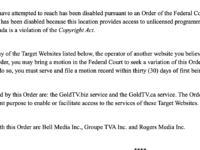Canadian digital tax policy has proven to be one of the most confusing areas of digital policy in recent years. For example, former Canadian Heritage Minister Melanie Joly struggled to convey a consistent position, often alternating between the 2015 electoral commitment of no Netflix taxes and the mounting pressure to implement some form of taxation on Netflix and other tech companies. It would appear that the complexity of the issue remains a challenge, as new Canadian Heritage Minister Steven Guilbeault issued as series of tweets yesterday that sought to clarify the government’s position. Yet rather than clarify, it highlighted how the government’s position remains somewhat confused.
News
Making the Best of a Bad Provision: Why Canada Should Work Toward a Copyright Term Extension Registration Requirement
The agreement on a revised Canada-US-Mexico Trade Agreement this week featured both good news and bad news. Among the positive changes in the revised agreement is the significant changes to the patent provisions, including the elimination of the ten years of protection for biologics. That provision would have required changes to Canadian law and added significant new costs to pharmaceuticals. Moreover, the retention of the Internet safe harbour provision is a win for freedom of expression in Canada as it will help ensure that free speech is not lost in the current rush to regulate Internet platforms.
On the downside, many of the problematic digital trade provisions remain unchanged (they can also be found in the CPTPP so their inclusion does not change much) as does the requirement for a copyright term extension to life of the author plus 70 years. The additional 20 years of protection beyond the international standard found in the Berne Convention will be costly for Canadians with little discernible benefit.
Honouring Ian Kerr’s Legacy: University of Ottawa Launches the Kerr Fellows Program
It has been nearly 100 days since our colleague and friend Ian Kerr passed away. During that time, scarcely a day goes by where I don’t think about Ian. Whether it is resisting the urge to send him a message seeking his advice or counsel, thinking about how he would have reacted to emerging developments, or passing by the closed door to his office, his presence is still strongly felt by the entire University of Ottawa and technology law communities. I have lost count of the number of times I’ve run into someone who I haven’t seen in awhile and their first response is to express their condolences and admiration for Ian. Indeed, seemingly everyone has a story of how Ian touched them or had a positive impact on their lives.
Canadian Copyright Website Blocking Underway As TekSavvy Appeals Federal Court Ruling
Last week I wrote about a federal court ruling that opened the door to copyright website blocking in Canada without Parliament establishing site blocking rules or the involvement of the CRTC. The decision is flawed from both a policy and legal perspective, substituting the views of one judge over Parliament’s judgment and relying on a foreign copyright case that was rendered under markedly different legal rules than those found in Canada. I concluded by noting that the case should be appealed and just over a week later, TekSavvy, the independent ISP that stood alone in contesting the blocking order, did just that. Even as the appeal was launched, however, the major Canadian ISPs began blocking access to the specific webpages identified in the court order.











